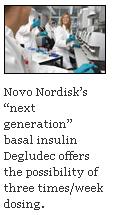Promising New Results for Novo Nordisk’s Next Generation Insulins

As a quick reminder, Degludec is Novo Nordisk’s new ultra-long acting basal insulin that has the potential to be used once a day or even three times weekly. DegludecPlus is comprised of both Degludec and Novolog, a basal and bolus combination. DegludecPlus offers the advantage of reducing the total number of insulin injections for basal and bolus insulin users (both type 1 and type 2) to just three per day (from the usual four to five)—for instance, if DelgudecPlus is administered prior to breakfast, bolus doses are then needed for lunch and dinner only. For more information on these compounds and their respective clinical trials, please see our New Now Next in diaTribe #22.

Although data from the Degludec phase 3 trials have not yet been released, we were fortunate enough to hear results presented from the smaller and shorter phase 2 trials for this compound at the American Diabetes Association conference earlier this summer. In comparison to sanofi-aventis’s Lantus (insulin glargine, the most commonly used basal insulin), Degludec given either once-daily or three-times-weekly achieved similar glycemic control and weight change (both were weight neutral). While three-times-weekly administration also produced similar rates of hypoglycemia as Lantus, once-daily degludec actually lowered the risk for hypoglycemia. While we will wait for the longer term phase 3 data before making any conclusions about Degludec, we are certainly intrigued by the possibility for three-times-weekly dosing with this compound. Administered on Monday, Wednesday, and Friday, Degludec could give people who take basal-only insulin the chance to enjoy their weekends without needing to deal with their pens and syringes! --BK







